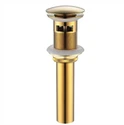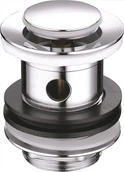Hey there! I'm in the sink waste supply business, and I've seen firsthand how sink waste can mess with water heater performance. In this blog, I'll break down the connection between sink waste and water heaters, sharing some real - world insights.
The Basics of Sink Waste
First off, let's talk about the different types of sink waste we deal with. We've got the Extended Long Slotted Basin Waste, which is great for those big - capacity sinks. It's got a long slot design that allows water to drain quickly, preventing clogs. Then there's the Long Slotted Basin Waste, a bit more compact but still very efficient at getting rid of water. And don't forget the Basin Strainer Waste, which is perfect for catching larger debris before it goes down the drain.
When we use sinks, all sorts of stuff goes down the drain. Hair, soap scum, food particles, and even small pieces of dirt are common. Over time, these things can build up in the pipes connected to the sink. And here's where it gets interesting – this build - up can have a domino effect on the water heater.
How Sink Waste Build - Up Affects Water Flow
The first way sink waste impacts the water heater is by restricting water flow. As the waste accumulates in the pipes, it narrows the passage for water. Think of it like a straw that's partially blocked. Water has a harder time getting through, and this affects the whole plumbing system.
In a water heater, proper water flow is crucial. If the water can't flow freely from the sink to the heater and back, it can cause all sorts of problems. For one, the heater may not receive enough water to heat effectively. This means you might end up with lukewarm water instead of the nice, hot shower you're looking forward to.
Also, restricted water flow can put extra stress on the water heater's pump. The pump has to work harder to push the water through the clogged pipes. This not only uses more energy but can also lead to premature wear and tear on the pump. Eventually, the pump might break down, leaving you with a non - functioning water heater.
Chemical Reactions and Scale Formation
Sink waste isn't just physical stuff. There are also chemical components in it. Soap, for example, contains various chemicals that can react with the minerals in the water. When these reactions happen in the pipes, they can lead to the formation of scale.
Scale is a hard, crusty deposit that can build up on the inside of pipes and the water heater's heating elements. It acts as an insulator, reducing the efficiency of the heating elements. When the heating elements are covered in scale, they have to work longer and harder to heat the water. This means higher energy bills for you.
Moreover, scale can cause uneven heating in the water heater. Some parts of the water may get over - heated while others remain cold. This can lead to inconsistent water temperatures and can even damage the water heater over time. If the scale build - up is severe enough, it can completely block the water flow in the heater, rendering it useless.
Bacterial Growth and Contamination
Another issue with sink waste is that it provides a perfect breeding ground for bacteria. The warm, moist environment inside the pipes, combined with the organic matter from the sink waste, is like a five - star hotel for bacteria.


These bacteria can travel from the sink pipes to the water heater. Once in the water heater, they can multiply rapidly. Not only is this unhygienic, but it can also cause problems with the water heater's performance. Bacteria can clog the small openings and valves in the water heater, affecting its operation.
In addition, some bacteria produce slime as they grow. This slime can coat the inside of the pipes and the water heater, further restricting water flow and reducing the efficiency of the heating process. And let's not forget about the health risks. Contaminated water from a bacteria - ridden water heater can cause all sorts of illnesses, from minor stomach upsets to more serious infections.
Preventive Measures
So, what can you do to prevent sink waste from ruining your water heater? First, be mindful of what you put down the sink. Avoid throwing large food particles, hair, or other debris down the drain. Use a sink strainer to catch as much waste as possible before it goes down.
Regular maintenance is also key. Have your pipes inspected and cleaned periodically. A professional plumber can use special tools to remove the build - up of waste and scale in the pipes. They can also check for any signs of damage or blockages in the water heater.
When it comes to choosing sink waste products, go for high - quality ones. Our Extended Long Slotted Basin Waste, Long Slotted Basin Waste, and Basin Strainer Waste are designed to be durable and efficient at preventing clogs. They can help keep your plumbing system in good shape and reduce the risk of problems with your water heater.
Impact on Energy Efficiency
Let's talk a bit more about energy efficiency. As I mentioned earlier, sink waste can lead to scale formation and restricted water flow, both of which make the water heater work harder. When a water heater has to work harder, it consumes more energy.
In today's world, where energy costs are constantly rising, this is a big deal. By taking steps to prevent sink waste from affecting the water heater, you can save a significant amount of money on your energy bills. For example, if you keep the pipes clean and free of scale, the water heater can operate at its optimal efficiency, using less energy to heat the same amount of water.
The Cost of Ignoring the Problem
Ignoring the issue of sink waste and its impact on the water heater can be costly. As we've seen, it can lead to reduced water heater performance, higher energy bills, and potential breakdowns. Repairing or replacing a water heater is an expensive affair.
A new water heater can cost anywhere from a few hundred to several thousand dollars, depending on the type and size. And if the problem is caused by sink waste build - up, it's a completely preventable expense. So, it's definitely worth taking the time to address the sink waste issue before it causes major problems with the water heater.
Conclusion
In conclusion, sink waste can have a significant impact on the performance of a water heater. From restricting water flow to causing scale formation, bacterial growth, and reduced energy efficiency, the problems are real. But the good news is that there are steps you can take to prevent these issues.
If you're looking for high - quality sink waste products to keep your plumbing system in top shape, we've got you covered. Our range of Extended Long Slotted Basin Waste, Long Slotted Basin Waste, and Basin Strainer Waste is designed to prevent clogs and ensure smooth water flow.
If you're interested in purchasing our sink waste products or have any questions, don't hesitate to reach out. We're here to help you keep your water heater and plumbing system running smoothly.
References
- "Plumbing Basics: Understanding Water Flow and Drainage." Home Plumbing Handbook.
- "The Effects of Scale on Water Heaters." Journal of Plumbing Science.
- "Bacterial Growth in Plumbing Systems." Water Quality Research Journal.






